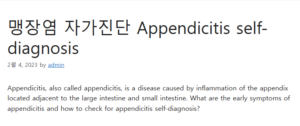Appendicitis, also called appendicitis, is a disease caused by inflammation of the appendix located adjacent to the large intestine and small intestine. What are the early symptoms of appendicitis and how to check for appendicitis self-diagnosis?

What causes appendicitis <appendicitis>?
Usually, appendicitis occurs when the inside of the appendix, the appendix, is blocked by various causes and causes inflammation. The most common case is that the lymphatic tissue around the appendix is overproliferated and the inside of the appendix is blocked. It can also be caused by obstruction of the inside of the appendix due to various causes, such as foreign bodies, parasites, tumors, or inflammatory strictures. 맹장염 자가진단
When the appendix is blocked, a problem occurs in the peristaltic movement of the intestine from the appendix to the large intestine, and as a result, bacteria multiply and toxic substances are secreted. Then, the mucous membrane inside the appendix is gradually damaged, and in severe cases, ulcers form. When the pressure inside the appendix rises, arterial blood flow becomes a problem, and the whole layer of the appendix wall necrosis, causing a hole to perforate. 좋은뉴스
early symptoms of appendicitis
As an early symptom of appendicitis, the first symptom is a loss of appetite, followed by gastronomic symptoms, followed by upper abdominal pain, followed by vomiting. The pain in the upper abdomen gradually moves to the pain in the lower abdomen, and a slight fever appears and a chill is felt.
Also, depending on the person, the area where the pain appears is different. Rather, there are cases where no pain is felt in the right lower abdomen where the appendix is located, or only slight tenderness during examination. There are cases in which the appendix ruptures and visits the emergency room with perforated peritonitis after simply pretending that there are no special symptoms. High fever may occur.
How to self-diagnose appendicitis
1. Even though I didn’t overeat, I still feel like I’m going to vomit. If the phenomenon of the stomach is not temporary, but continuously, you should suspect appendicitis (appendicitis).
2. If you suddenly feel severe pain in your right side or feel unbearable pain, it is most likely appendicitis. In particular, since abdominal pain tends to descend from the upper abdomen to the lower abdomen, it is distinguished from general abdominal pain, so you can know that it is different from the pain you usually feel.
3. Check for pain when pressing the right lower abdomen, appendix (McBurney Point). McBurney Point refers to the outer two-thirds of an imaginary line connecting the belly bone, the bone protruding from the front of the pelvis, and the pelvic bone. If the pain when pressing is worse than the pain when pressing, you should suspect the early symptoms of appendicitis.
4. Appendicitis, which is an inflammation of the little finger-sized appendix at the end of the appendix, can be mistaken for a gastric disease such as enteritis or food poisoning with similar symptoms. say you can. Check if the pain in the right lower abdomen is accompanied by a low fever. If unbearable pain and a high fever appear, it may be a symptom of a ruptured appendix, so it is recommended to go to the hospital immediately and check it out.
5. If the pain repeats in the right lower abdomen when jumping or lifting the heels of both feet and then lowering them back to the floor, this should also be suspected of appendicitis. It’s good to check with appendicitis self-diagnosis, but the most accurate thing is to find a hospital and get a diagnosis from a specialist, right? If you have any doubts, go to the hospital.
5. Appendicitis can appear with symptoms similar to digestive system diseases such as headache, diarrhea, constipation, and enteritis, but the location of the appendix is different for each person, and the initial symptoms appear differently for each person, accompanied by constipation or diarrhea, and slight fever.
How to treat appendicitis
In the early stages of appendicitis, the pain is not severe, so it is thought that it is simply a stomachache, and if you take medicines such as antibiotics or painkillers, the pain may be masked and an abscess may develop around the appendix. If the appendix is not operated on within about 3 days of the onset of symptoms, the appendix may rupture and an abscess may form around the ruptured appendix, spreading pus throughout the abdominal cavity, which may develop into peritonitis. If you receive treatment after peritonitis occurs, the recovery period is longer, and complications such as sepsis or intestinal adhesions may occur after surgery, so it is recommended to detect and treat it early.
Today, we looked at the initial symptoms of appendicitis and how to self-diagnose appendicitis. Rather than self-diagnosis by the general public, I think the best way to find out if you have any abnormal symptoms is to visit a specialist hospital, get a diagnosis from a doctor, and receive appropriate treatment. ~!! Take good care of your health and I hope you have a happy and enjoyable day today.